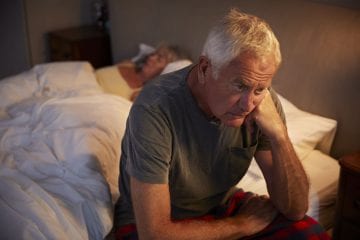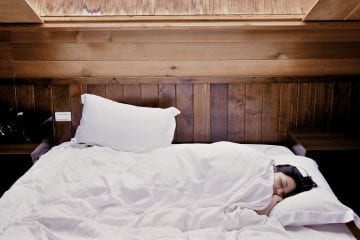Insomnia is a sleep disorder that affects approximately 40 million people in the U.S. alone. That is roughly 25% of the total population with about 20 million experiencing occasional short-term insomnia. There are numerous reasons why people have trouble falling and staying asleep. Alternating sleep cycles (due to shift work), poor sleep habits, diet, and stress all contribute to sleepless nights. Here are 10 tips to prevent insomnia from keeping you up at night.
Create a sleep schedule
You have an internal clock that tells you when to go to sleep and when to wake up. It is regulated by the amount of sunlight you’re exposed to based on a 24-hour cycle. This is referred to as the circadian rhythm and it helps your body regulate the sleep pattern. One way to reset this biological clock is to go to bed and wake up at the same time every day. According to The National Sleep Foundation lying in bed awake can contribute to sleeplessness. They recommend getting up whenever you've been awake for more than 20 minutes. Do something until you begin to feel sleepy and then try again.
Cut out caffeine after 12pm
Caffeine is a stimulant and can stay in your system for up to 7 hours. If you have trouble sleeping, don’t drink any after noon. Besides the fact that it can inhibit sleepiness in the evening hours a full bladder will keep you up making trips to the bathroom all night. You should also avoid alcohol. While it is known to sometimes relax you, it does not help you sleep and may actually cause you to have interrupted sleep. Limit alcohol consumption to one or two drinks with a meal.
Change your eating habits
The food that your body uses for fuel can contribute to poor sleep. If you want to know how to prevent insomnia, change what you eat before going to bed. Your meals should be light and balanced throughout the day. You should eat your biggest meal early in the day because digesting food requires a lot of energy.
Sometimes you can hear it - it makes a grumbling noise that is different from the sound your tummy makes when you’re hungry. That is your stomach digesting the food you ate. So you see why it’s not a good idea to eat a heavy meal before bedtime. Going to bed on a full stomach is uncomfortable and makes it hard to relax. You should avoid anything fried or greasy if you tend to get heartburn or acid reflux.
Try a natural supplement
While sleeping pills are not recommended due to their side effects, you may find that a natural supplement can help you relax and fall asleep. Many people avoid sleeping aids because they don’t want to become addicted to them. But that is not a concern with supplements like melatonin. It is a hormone produced by the body that helps to regulate your natural sleep cycle. As we age, our melatonin levels drop, so supplementing can help regain the balance. Since it is a natural substance, there are no side effects and no risk of addiction.
Eat cherries as a bedtime snack
If you love cherries, this one will be easy to apply. Dark red cherries are a source of L-tryptophan, an amino acid that is converted by the body into 5HTP, a precursor to melatonin. It is great for boosting your melatonin levels. A handful of cherries eaten an hour before bedtime can help you fall asleep faster.
Try yoga
Doing light yoga or meditation before bedtime is very relaxing and can help your body to get ready for sleep. Yoga is a gentle way to wind down. Concentrate on your breathing, slowly inhaling and exhaling. Breathing is very important for blood circulation. Practice breathing techniques for 3 minutes before moving on to the next activity.
Try a little exercise
This does not mean strenuous exercise. Some people find that a brisk walk for 20 minutes on the treadmill or around the block can tire them and make falling asleep easier. Excessive energy can keep you awake. If you’re not tired, do something until you begin to feel sleepy.
Limit electronics late at night
The screens of laptops, TVs, and cell phones emit blue light that can keep you awake. The blue light inhibits production of melatonin, the body’s natural sleep hormone. Electronics stimulate the mind, and suppress your natural response to sleep. Turn them off about 30 minutes before you plan to go to bed.
Keep your room cool
Take a hot shower right before bed and lower your thermostat to between 65° and 75°F. You may feel sleepy after the shower because hot water helps you relax. Plus, when your body temperature drops, you produce more melatonin, so sleeping in a cool room helps you sleep better.
If you smoke, quit
Nicotine, like caffeine, is a natural stimulant and keeps you from falling asleep when you should. If you wake up during the night to smoke, those withdrawal pangs will keep you awake. There is no better reason to quit now than getting better sleep. Eliminating stimulating substances at night will help you fall asleep faster and sleep better.
Sometimes our habits can affect how we sleep. A busy stressful daytime routine can make it hard to wind down and relax at the end of the day. Small changes to your evening routine make a big difference to the quality of sleep. Try these tips for preventing insomnia, and if they help you, pass them on to a friend.



